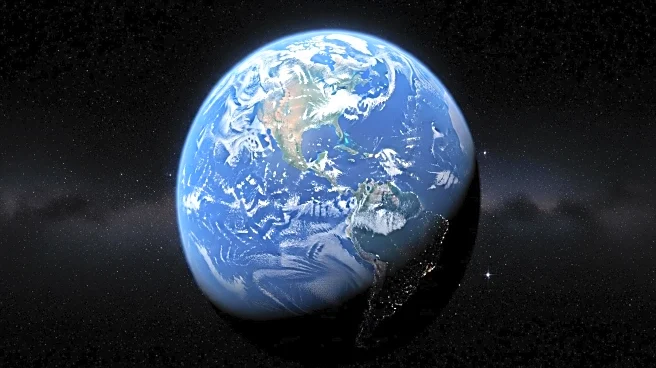What is the story about?
What's Happening?
Researchers have identified the 2010-2011 La Niña event as a significant contributor to the reduction in Earth's Chandler wobble observed in 2015. The Chandler wobble is a deviation in Earth's rotational axis that typically causes a drift of about 20 feet over a 14-month cycle. The study, published in Geophysical Research Letters, suggests that mass anomalies following the La Niña event, which was one of the strongest on record, led to significant ocean mass loss due to altered precipitation and evaporation patterns. This, in turn, affected the Chandler wobble. The study authors, Taehwan Jeon and Ki-Weon Seo, noted that while global climate events like the El Niño Southern Oscillation (ENSO) have a stronger influence on such phenomena than local changes, not every ENSO event has the same impact. The 2010-2011 La Niña was particularly influential in altering Earth's polar motion.
Why It's Important?
Understanding the factors influencing Earth's rotational dynamics is crucial for geophysical and climate science. The findings highlight the significant impact of large-scale climate events on Earth's physical behavior, which can have broader implications for climate modeling and prediction. The study underscores the role of human-driven climate change in amplifying ENSO events, potentially leading to more frequent or severe disruptions in Earth's rotational patterns. This research could inform future studies on how climate change might affect Earth's geophysical processes, with implications for navigation, satellite operations, and understanding long-term climate patterns.
What's Next?
The researchers suggest that the Chandler wobble may continue to fluctuate as ENSO events are influenced by climate change. They anticipate that the wobble's amplitude, which has been increasing since late 2020, may soon return to pre-2010 levels. Future research will focus on identifying which types of ENSO events most significantly impact Earth's polar motion and the characteristics that make them influential. This could lead to improved predictive models for Earth's rotational behavior and its interaction with climate phenomena.
Beyond the Headlines
The study raises questions about the long-term effects of climate change on Earth's geophysical processes. As ENSO events become more pronounced, their impact on Earth's rotation could become a critical area of study. This research also highlights the interconnectedness of global climate systems and Earth's physical dynamics, suggesting that changes in one area can have far-reaching effects. The findings may prompt further investigation into how other climate-related factors, such as ice mass changes, contribute to Earth's rotational dynamics.
















